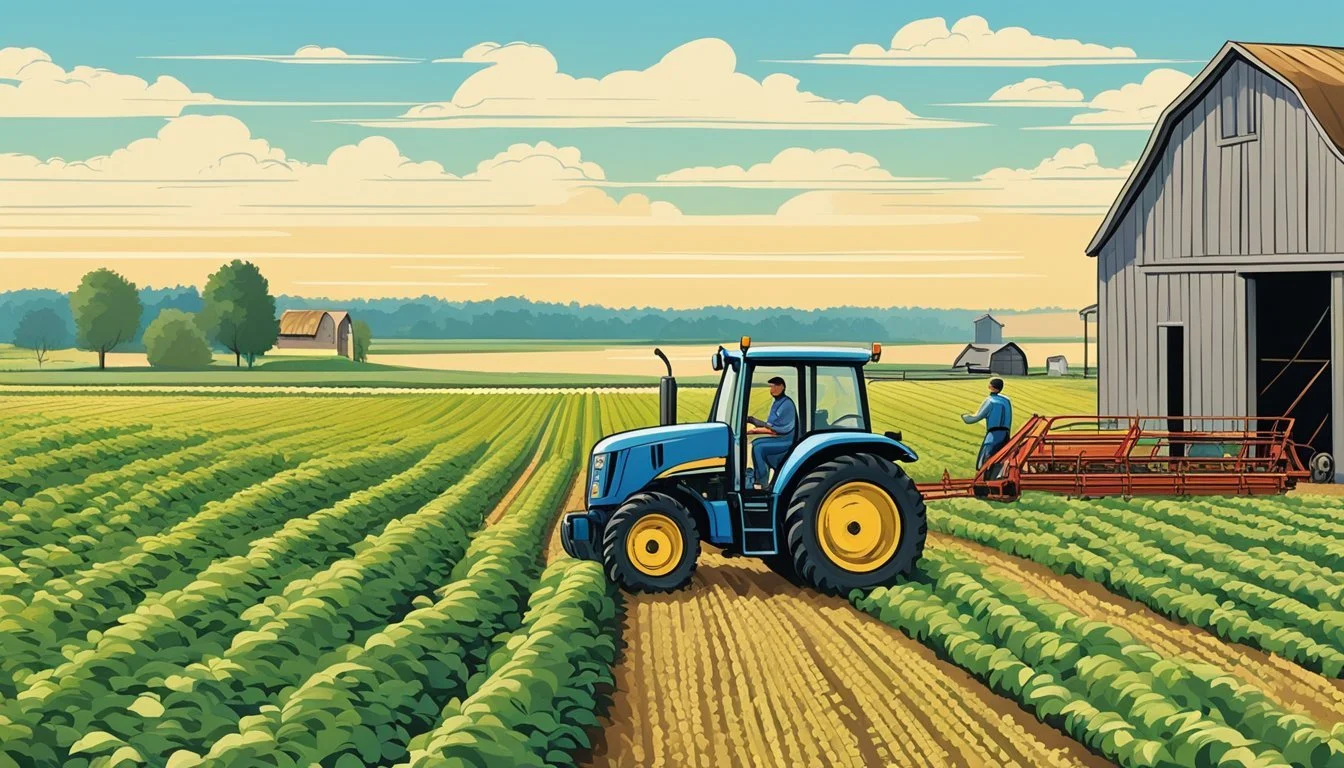Right to Farm Law in Mississippi
Understanding Agricultural Protections
In the state of Mississippi, the Right-to-Farm Law serves as a critical piece of legislation designed to protect existing agricultural operations from nuisance lawsuits. Initially enacted in 1980, the law reflects a continuum of legislative efforts aimed at supporting and preserving the agricultural industry, which plays a significant role in the state’s economy and heritage. Given that agricultural practices can sometimes lead to conflicts with neighboring landowners, especially as urban and suburban boundaries expand into traditional farming areas, Mississippi's statute provides legal safeguards for farmers, allowing them to operate without the looming threat of undue litigation.
Despite these protections, the agricultural landscape in Mississippi has experienced considerable shifts since the Right-to-Farm Law was first put into place. There has been a marked decrease in both the number of farm operations and the acreage under cultivation, with a 37 percent drop in farm operations and a 29 percent reduction in farmed acreage. These changes underscore the complex interplay between legal frameworks, land use, and the economic aspects of farming.
The law specifically grants immunity to agricultural operations from nuisance suits, provided they comply with generally accepted agricultural practices and applicable regulations. This immunity applies to a range of agricultural activities, including traditional farming, forestry operations, and aquaculture. As debates around land use intensify and the state evolves, the Right-to-Farm Law in Mississippi remains a key point of reference for both legal professionals and the agricultural community at large, demonstrating the ongoing negotiation between agricultural practices and residential expansion.
Historical Context and Overview of Right to Farm Laws
Right to Farm laws in the United States have evolved to balance the interests of agricultural producers against the concerns of neighboring landowners.
Evolution of Right to Farm Laws in the US
Right to Farm laws were introduced to stem mounting conflicts between traditional agricultural land use and urban expansion. New Jersey was the first to enact such a law in 1979 to shield farmers from nuisance lawsuits as residential developments sprawled into previously rural areas. Soon, every state across the federation, supported by the federal government's stance to protect agriculture, followed suit. These laws have been dynamic, varying from state to state and changing to address new agricultural challenges.
Basic Principles of Right to Farm Laws
The basic premise of Right to Farm laws is to protect eligible farmers and ranchers from nuisance lawsuits, particularly those initiated by individuals who move into an area with pre-existing agricultural operations. These laws generally allow for normal farm operation while limiting the circumstances under which they may be considered a nuisance, thereby promoting agricultural stability and survival.
Mississippi Right to Farm Law Origins
The Mississippi Legislature tailored its Right to Farm law to safeguard a traditional southern agricultural way of life, legislating it into effect following the national trend in the 1980s. The Mississippi law specifically enumerates protection for a broad range of agricultural operations, including livestock, farm-raised fish, and timber-related activities, reflecting the state's diverse agricultural portfolio. Over the years, rather than a rigid framework, Mississippi's Right to Farm law has adapted to numerous legal challenges, shaping its current form through court interpretations.
Key Provisions in Mississippi's Right to Farm Law
Mississippi's Right to Farm Law is designed to protect agricultural operations by establishing certain defenses and conditions that govern agricultural practices within the state.
Definition of Agricultural Operations
An agricultural operation in Mississippi encompasses a range of activities including the production and processing of crops, livestock, farm-raised fish and fish products, timber, and other products of the beehive. These operations are integral to the state's rural economy and are broadly defined to ensure comprehensive coverage under the Right to Farm Law.
Nuisance Lawsuit Defense
A key provision in the nuisance lawsuit defense grants agricultural operations that have been established for over a year a form of immunity from nuisance lawsuits, provided they comply with applicable laws. This means that long-standing operations cannot be sued for nuisances such as noise or odors typically associated with farming, as long as they adhere to state and federal regulations.
Status of Federal Permits
For the nuisance lawsuit defense to be valid, agricultural operations must be in compliance with all applicable state and federal permits. This compliance ensures that operations maintain the absolute defense against nuisances provided by the Right to Farm Law and signals responsible management and adherence to environmental and safety standards.
Legal Applications and Court Rulings
In the context of Mississippi's Right to Farm laws, court decisions have both defined and refined the scope of legal protections for agricultural operations. These rulings have significant implications for nuisance claims and the establishment of legal precedent.
Supreme Court of Mississippi Decisions
The Supreme Court of Mississippi has regularly interpreted the Right to Farm laws to clarify their scope. For example, the court has addressed how these laws shield agricultural operations from various nuisance suits. Key decisions include interpretations of the law as it applies to changes in farming practices and the expansion of operations.
Notable Case Studies
Briggs v. Hughes stands as a benchmark for Right to Farm applicability in the state. In this case, the court assessed whether certain agricultural practices constituted a nuisance. Legal arguments often hinge upon whether practices were established prior to the surrounding non-farming developments and if the operation complies with generally accepted agricultural standards.
Impact of Trial Court Rulings
Trial courts in Mississippi have also shaped the discussion, particularly when it comes to nuances such as the introduction of new agricultural practices. Rulings at this level have influenced how long a practice must be in place before it is considered established and protected under the Right to Farm statute. Trial court rulings can dictate the pace at which farm operations adapt to new technologies while balancing the interests of neighboring properties.
Protection for Farmers
Mississippi's Right to Farm Law serves as a shield for farmers and ranchers, ensuring continuity of agricultural practices and safeguarding against nuisance claims.
Legal Defense Against Nuisance Claims
In Mississippi, Right to Farm legislation provides farmers and ranchers a robust defense in the event of nuisance lawsuits. If agricultural operations adhere to generally accepted practices and are established prior to surrounding non-agricultural developments, they are typically afforded protection against claims regarding noise, odor, or pollution that could arise due to their operations. This defense is pivotal in curbing legal actions that could otherwise threaten the viability of farming operations.
Supporting Farming as State Interest
The Right to Farm statutes underscore that sustaining and advancing agriculture is in the state's interest. By protecting farmers and forestry activities, Mississippi recognizes that the success and preservation of these sectors are crucial for the state's economy and heritage. The law specifically fortifies the right of farmers to engage in agricultural practices without the undue burden of litigation, promoting an environment where farming can thrive against the pressures of urban encroachment.
Role of Right to Farm in Protecting Farmers
The Right to Farm law plays a key role in protecting farmers from potentially crippling nuisance lawsuits. This legal framework assures that long-standing farms are not subject to lawsuits from new residents who may not understand or appreciate the realities and necessities of agricultural practices. Moreover, it helps secure the legacy of family farms across the state by allowing them to operate with a greater sense of security, without the constant threat of legal challenges based solely on their day-to-day activities.
Challenges and Limitations
Mississippi's Right to Farm laws are designed to protect agricultural operations but are subject to certain challenges and limitations that may constrain their effectiveness.
Limits of Blanket Protection
Mississippi’s Right to Farm (RTF) laws do not provide unconditional protection to agricultural operations. Protection under these laws is conditional based on several factors such as the type of farming activity and its existence within the legal definitions. For instance, facilities not fitting the state's definition, like certain timber and wood-related products, may not be covered under the statute.
Challenges Posed by Neighbors
Agricultural entities may face challenges from neighbors who submit nuisance lawsuits. While RTF laws aim to shield farms, they must balance between the rights of agricultural entities and those affected in neighboring areas. Conflicts often arise when the operation causes odors, noise, or other disturbances that the surrounding community deems as nuisances.
Dealing with New and Expanding Practices
The handling of new and expanding agricultural practices under RTF laws can be complex. Legal protection often requires that such practices are in place for a minimum duration, typically a year, before a farm can claim RTF defenses. This time-bound requirement is meant to prevent sudden changes that could adversely affect neighboring lands and lifestyles.
Best Practices in Agriculture
Best practices in agriculture are essential for maintaining the integrity of farming activities while adhering to Mississippi's Right-to-Farm laws. These practices aim to balance productivity with environmental stewardship and community relations.
Incorporating Best Management Practices
Agricultural producers are encouraged to implement Best Management Practices (BMPs) to enhance their operations. BMPs often include soil conservation, water management, and the judicious use of fertilizers. By doing so, they not only optimize yield but also contribute to the sustainability of the agricultural sector.
Expert Testimony and Research
The use of expert testimony and research can greatly benefit agricultural practices. Experts in fields such as agronomy, animal husbandry, and environmental science can provide valuable insights. Their knowledge helps ensure that farms adopt strategies based on the latest findings and technologies, mitigating potential environmental impacts and improving overall efficiency.
Pest and Noise Control Measures
Effective pest control is crucial in protecting crops and livestock. Farmers may employ integrated pest management strategies that combine biological, cultural, and chemical tools. For instance, the use of propane cannon scare guns to deter birds must be balanced with community norms to avoid nuisance complaints. Such devices should be deployed considering the proximity of residential areas and local noise regulations.
Impacts on Local Communities
Mississippi's Right to Farm (RTF) laws play a significant role in addressing the concerns of rural areas and neighboring properties regarding agricultural practices. These laws strive to strike a balance between sustaining agricultural operations and protecting community interests.
Balancing Interests of Rural Areas
In rural Mississippi, RTF laws are designed to support the livelihood of farmers by safeguarding normal farming operations from nuisance lawsuits. Such protections aid in ensuring that agricultural practices, including the raising of livestock and poultry, can continue without the threat of legal action that may arise from the expected inconveniences of farming. However, the implementation of these laws must consider the interests of rural communities, which may face challenges from agricultural activities that affect their health and environment.
Agriculture and Neighboring Properties
Neighboring properties to farms must coexist alongside the ongoing agricultural activities that are intrinsic to rural life. RTF laws define acceptable parameters for farming operations, encompassing the growing, production, and processing sites. Agriculturists are thus provided with a measure of immunity against certain legal complaints, ensuring the continuity of their work. Yet, this legislation has raised concerns over the ability of residents to exercise their rights when faced with issues stemming from adjacent agricultural operations. The tension between agricultural needs and the well-being of residents requires ongoing dialogue and careful legal consideration to maintain a fair balance between these competing interests.
Case Studies in Mississippi Farming
In Mississippi, farming practices have evolved to balance productivity with state laws. This has led to several notable case studies, particularly regarding cotton and soybean crop management, livestock and poultry farming, and the innovative use of scare guns for pest control.
Cotton and Soybean Crop Practices
Cotton and soybean crops in Mississippi are foundational to the state's agricultural output. Producers adhere to Right-to-Farm laws to ensure their practices are defended against nuisance lawsuits, provided they remain compliant with relevant permits. Cotton, often vulnerable to various pests, benefits from strategic pest management techniques. Similarly, soybean farmers employ crop rotation and other practices to maintain soil quality and resist pest pressures.
Livestock and Poultry Farm Case Studies
Mississippi's livestock and poultry sectors have illustrated the importance of Right-to-Farm laws in protecting established farming operations. Case studies have shown that farms operating for over a year and in compliance with state and federal regulations can optimize livestock and poultry production without the fear of nuisance litigation. This includes managing odors, noises, and other potential disturbances common to livestock and poultry farming.
Use of Scare Guns in Pest Control
Farms often have issues with deer and other wildlife damaging crops. The state's Right to Farm Act has factually backed the use of propane cannon scare guns to protect fields. A landmark case upheld the use of these scare guns after a year of farm operation, demonstrating the Act's role in sanctioning effective, non-lethal wildlife control methods to safeguard agricultural investments in crops like cotton and soybean.
State Law and Federal Oversight
The Right to Farm Law in Mississippi is governed by a complex framework that intertwines state statutes with federal regulations. This section examines the distinct yet related roles of the Mississippi Department of Agriculture and Commerce in applying these laws along with the manner in which federal regulations intersect with state-level agricultural legislation.
Mississippi Department of Agriculture's Role
The Mississippi Department of Agriculture and Commerce (MDAC) serves as a pivotal state agency overseeing the enforcement and implementation of agricultural laws within Mississippi. The state's Right to Farm (RTF) law, which falls under the jurisdiction of MDAC, aims to protect existing agricultural operations from nuisance lawsuits. It defines agricultural operations broadly to include activities such as livestock, farm-raised fish, and timber production, as legally affirmed in various court rulings.
Key MDAC Responsibilities:
Regulatory oversight: Enforce state RTF statutes to ensure compliance with legal protections afforded to farmers.
Supportive services: Provide guidance and information to agricultural producers on navigating and adhering to RTF regulations.
Interplay with Federal Farming Regulations
Federal farming regulations are designed to address a wide range of activities in the agricultural sector, and they frequently work in tandem with state laws like Mississippi's RTF statutes.
Examples of this interplay include:
Environmental standards: While state laws regulate farm operations, federal regulations like the Clean Water Act (CWA) and the Clean Air Act (CAA) impose additional environmental obligations that farms must meet.
Food safety: The Food Safety Modernization Act (FSMA), a federal law, works alongside state regulations to ensure the safety of food produced and processed in Mississippi.
These laws often necessitate coordinated efforts between state and federal agencies to ensure agricultural producers are in compliance with all applicable laws. The Mississippi Department of Agriculture facilitates this by interfacing with federal entities to harmonize state and federal mandates.
Navigating Legal Resources
Legal practitioners, farmers, and researchers can find a wealth of information on Mississippi's Right to Farm laws through various accessible resources. These resources provide comprehensive guides, charts for reference, and detailed legal texts to ensure that stakeholders can navigate the legal landscape with confidence.
Accessing Information on Right to Farm
Mississippi's Right to Farm laws are available for free access through the Mississippi Department of Agriculture and Commerce's website. It provides the latest updates on regulations, including detailed descriptions of what constitutes an agricultural operation. Users can access the Mississippi Code at Section 95-3-29 for specifics of the legislation. In addition, publicly accessible databases store archived legal cases, enabling interested parties to research precedent-setting decisions that impact the application of Right to Farm laws.
National Agricultural Law Center Resources
The National Agricultural Law Center serves as a pivotal resource for stakeholders looking to understand Right to Farm laws on both a state and national level. This resource offers free access to a repository of agricultural legal publications and national reference guides. The center also provides analyses of current legal issues affecting the farming community for a broader perspective on how Mississippi's laws interconnect with federal regulations.
Charts and Research for Legal Guidance
For visual aid and simplification, charts that summarize key aspects of Mississippi’s Right to Farm Law can be immensely helpful. Researchers and legal counsel can utilize these charts for a clear and concise reference. Additionally, scholarly articles and research papers on the topic are available through academic databases, including up-to-date studies examining the implications of recent legal changes.
Economic and Social Implications
The Right-to-Farm (RTF) laws in Mississippi have far-reaching effects on the economic viability of agricultural operations, as well as the social relationships between farming communities and suburban developments. These laws shape the landscape of rural economies and define the interactions within these communities.
Economic Impact on Agricultural Sector
RTF laws provide legal protections for farming operations, which include facilities linked to livestock, poultry, and timber. For example, a company like Smithfield Foods, heavily vested in livestock operations, benefits economically from RTF laws as they can defend against nuisance lawsuits, which often claim damages due to the externalities from farming activities. The assurance that these protections offer translates to a lower cost of doing business and decreases the potential financial liability for established farms. By securing operations, RTF laws encourage investments in the agricultural sector and sustain its economic growth.
Social Dynamics Between Farmers and Communities
The introduction of RTF laws impacts the social fabric between farmers and their neighboring communities. These laws often act as a shield for farmers against suburban encroachment. However, there is a dual effect: while they safeguard the farming community’s interests and traditional practices, they also might lead to friction with non-farming residents concerned about environmental impacts and quality-of-life issues stemming from nearby farming activities. In balancing these interests, RTF laws aim to maintain harmony by ensuring that as long as farms comply with standard agricultural practices, they remain protected, thus preventing potentially fractious legal disputes.
Looking Forward
Mississippi's agricultural landscape is poised to evolve, with ongoing legal protections and statutory changes playing pivotal roles in shaping the future of farming.
Future of Farming and Legal Protections
Mississippi has maintained a right-to-farm law since 1980, providing robust legal shields for farmers. This legislation supports qualifying farmers by defending agricultural practices from nuisance lawsuits, provided they adhere to state regulations. The future of farming in Mississippi continues to rely on these legal protections to ensure that agriculture can proceed without undue hindrance.
Specific details of the right-to-farm statutes protect established farms from new neighbors who may file complaints about the normal operations of farming—operations that are both traditional and vital to the state's economy. With legal protections in place, farmers can invest in their businesses with greater confidence, knowing that their right to farm is upheld by law.
Anticipated Changes in Legal Statutory Schemes
Looking ahead, statutory schemes may be updated to reflect modern agricultural practices and challenges. Legislative bodies are expected to consider factors such as technological advances, environmental impact, and community development when refining these statutes.
Changes might involve:
Clarifying the definitions of farming practices
Implementing enhanced guidelines for new agricultural technologies
Balancing growth in urban areas with existing rural farm operations
As Mississippi continues to navigate the intertwined paths of agricultural innovation and rural community preservation, its legal statutory schemes will play a critical role in ensuring that both progress and tradition are respected and maintained.









